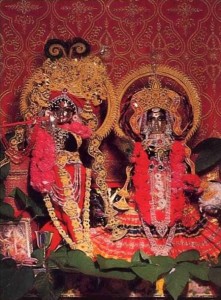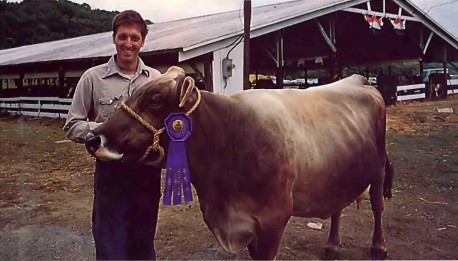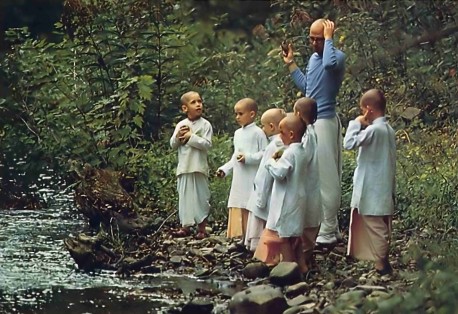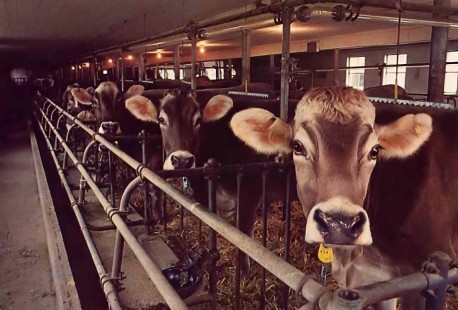by Dhrstadyumna Swami


Near Port Royal in central Pennsylvania is a spiritual farming community called Gita-nagari, literally “a transcendental village where the teachings of the Bhagavad-gita are lived and sung.” Like every other ISKCON farm, Gita-nagari has two purposes: first, to provide a working model of ancient India’s Vedic culture as a positive alternative to today’s technological culture; and, second, to provide a perfect setting where anyone can attain the highest perfection of life—unalloyed devotional service to the Supreme Lord, Krishna.
The wisdom of the Vedic culture is that it recognizes the ultimate authority of the Supreme Lord in all matters. Thus the Vedic culture directs its members to serve the eternal Personality of Godhead rather than the things of this temporary and miserable material world. (Sri Isopanisad, Mantras One and Two) “Why serve at all; I’ll simply remain independent,” you might say. But if you think about it, you’ll agree that every living entity, in whatever species of life, is rendering service to someone or something. A man serves his wife and children, his boss, his car, his city and nation, and (most basically) the demands of his body for food, rest, pleasure, safety, and so on. Animals also have their “families” and their bodies’ demands to serve, and the plant kingdom serves man by supplying fruits, flowers, grains, herbs, and so forth. Through reincarnation one’s body or object of service may change, but the mentality of service remains. This mentality of service is called sanatana-dharma, our eternal occupation.
As mentioned above, Vedic culture directs everyone’s service toward the Supreme Lord. By the institution of varnasrama, the leaders of a Vedic society scientifically divide the citizens into four social orders (varnas) and four spiritual orders (asramas). Without this systematic division, everyone’s service is misdirected and society degenerates into chaos.

The four social orders function together much as the various limbs of our body cooperate for the well-being of the whole body. Just as our body must have a brain for thinking, arms for defending, a stomach for digesting, and legs for giving support, so the social body must also have an intelligent class (brahmanas) for giving spiritual direction, an administrative and military class (ksatriyas) for managing and defending, a mercantile class (vaisyas) for providing the economic base, and a laboring class (sudras) for giving manual assistance to the other classes. If we think carefully about this analogy, we can see that these divisions of labor have existed in all civilizations at all times, no matter what the political or economic system.

Why are these divisions of labor always present in society? Because they are created by God. As Lord Krishna states in the Bhagavad-gita: “According to the three modes of material nature and the work ascribed to them, the four divisions of human society were created by Me” (Bg. 4.13). So you can’t artificially create a classless society, any more than you can make a dog the king. You can put a dog on the throne, adorn him with all the finest raiment, and place the royal scepter in his paw, but when you throw a bone on the ground he’ll jump down and gnaw it. Similarly, if unqualified men occupy intellectual and administrative posts, then society is doomed to chaos, confusion, and decline. The Vedic literatures explain that one proves himself by his qualities and his work (not by his birth in a good family!) (Srimad-Bhagavatam, 7.11.35) and that everyone should find satisfaction in his particular occupation by offering all the results of his work to God. (Bhagavad-gita 18.47, 48)
The Bhagavad-gita first describes the qualities for the intellectual class: peace-fulness, self-control, austerity, purity, tolerance, honesty, wisdom, knowledge, and religiousness. Next, the Gita lists the qualities of work for the administrators and warriors: heroism, power, determination, resourcefulness, courage in battle, generosity, and leadership. In addition, the Gita explains that the kinds of work proper for the merchants and farmers are agriculture, cow protection, and trade, and that the laborers assist the three other classes. (Bg. 18.41-44)
Interwoven into the social fabric are the four spiritual orders—student life (brahmacari), married life (grhastha), retired life (vanaprastha), and renounced life (sannyasa). These orders provide the necessary spiritual discipline to keep society from descending to the animal platform—simply worrying about the problems of eating, sleeping, mating, and defending. No matter how sophisticated their technology, men who concern themselves only with these four problems are no better than polished animals. And any amount of philosophy which does not solve life’s real problems—birth, death, disease, and old age—is merely intellectual animalism. So the four spiritual orders insure that the primary goal of human life—self- and God-realization—is not lost in the day-to-day struggle for existence.

In student life (brahmacari) one learns to control his senses and humbly serve a bona-fide spiritual master. Generally, a brahmana remains celibate throughout his life. Although some brahmanas get married and enter household life, they indulge in sex only under the guidance of the spiritual master and only for begetting God-conscious children. (Srimad-Bhag. 7.12.11, Purport) Because the child’s consciousness will reflect the parents’ consciousness at the time of conception, the Vedic system stresses the chastity of women and prohibits free mixing between the sexes. Marriage is a solemn, life-long vow, and there is no such thing as divorce. (Srimad-Bhag. 9.20.22, Purport) As the First Chapter of the Bhagavad-gita describes, unrestricted association of men and women leads to unwanted progeny—which creates a hellish situation in society. (Bg. 1.39-43) Just witness today’s social scene: broken homes, illegitimate children, abortions, and urban decay all bear out these age-old truths.
After their children are grown, the parents should retire from worldly pursuits and family affairs and travel to holy places of pilgrimage. This vanaprastha stage prepares the parents for leaving this world behind at death and attaining the eternal spiritual world. When the husband is sufficiently detached, he leaves his wife in the care of his eldest son and takes sannyasa, the renounced order. Then he travels and preaches the message of God from village to village.
Of course, from all this you shouldn’t get the idea that devotees compete for better positions in a social or spiritual hierarchy. Whatever their status of life, devotees of the Lord are above ordinary material designations. In the Bhagavad-gita Lord Krishna clearly states that if someone offers Him all the fruits of his activities and takes shelter exclusively of Him, then he is above the actions and reactions of nature and attains the supreme goal—an eternal, blissful life of knowledge in Lord Krishna’s direct association. (Bg. 18.56-58) So devotees of the Lord have nothing to gain through mundane “social climbing.” However, to provide an example for the world at large, devotees may take up any position in society, whether seemingly inferior or superior. In this way the devotees follow the Lord’s instructions in the Bhagavad-gita:
“As the ignorant perform their duties with attachment to results, similarly the learned may also act, but without attachment, for the sake of leading people on the right path” (Bg. 3.25).
Therefore, here at Gita-nagari we live and work according to the divine Vedic institution called varnasrama. This way we facilitate our own journey back to Godhead and show the proper social and spiritual system to a lost world floundering in the darkness of various “isms”—communism, capitalism, altruism, egotism, and so on—which can never bring the peace and prosperity everyone hankers for.

Another purpose of farms like Gita-nagari is to provide the International Society for Krishna Consciousness with economic self-sufficiency. The responsibility for economic development rests on the farmers and mercantile men (vaisyas), most of whom are married, and the economy itself centers upon the land and cows. If there are sufficient grains and milk, then there is no economic scarcity. This year we harvested twelve tons of wheat, twelve tons of potatoes, thirteen tons of barley, twenty-five acres of corn, twelve acres of oats, five acres of soybeans, and ten thousand bales of hay and alfalfa. The Brown Swiss cows are delivering more than eight hundred pounds of milk a day, and to minimize our dependency on machines and come closer to that ideal of “simple living and high thinking,” we’re training the oxen to till the fields.
The idea of simple living and high thinking is so essential that one of America’s founding fathers considered it paramount. In his Notes on the State of Virginia, Thomas Jefferson wrote this:
” Those who labor on the land are the chosen people of God. Corruption of morals in the mass of cultivators of the land is a phenomenon of which no age or nation has furnished an example. Corruption is a mark set on those who, not looking up to the heavens for their subsistence (as does the husbandman), depend on workshops and selling to the caprice of customers. While we have land to labor, let us never wish to see our citizens occupied at workshops. Carpenters, masons, smiths [simple technology] are needed in husbandry, but for general operations of manufacture let the workshops remain in Europe. The mobs of great cities add just so much to the support of pure government as sores do to the strength of the body.” (Jefferson, Thomas. Query XIX on Farming and Manufacturing)
Just see how far our nation has strayed from the vision of the founding fathers! The more we go on expanding our huge and troublesome industries and squeezing out our vital human energy, the more we’ll feel unrest and dissatisfaction, though the few cunning exploiters among us may live lavishly for a time. We already have more than enough grain, fruit, vegetables, minerals, water, fresh air, and milk to live comfortably and cultivate spiritual life. So why should we hanker after terrible industrial enterprises that prey on the masses of unfortunate men? Better an honest living in the fields than a false standard of living that can never lead to lasting happiness.
As its main purpose the varnasrama system trains everyone to become the Lord’s pure devotees—eligible to return at death to the spiritual kingdom and thus escape repeated birth in this material world. So all the residents of Gita-nagari strictly follow the rules and regulations of bhakti-yoga, as prescribed by our beloved spiritual master Srila Prabhupada. For instance, we rise before sunrise, chant the Hare Krishna mantra, worship the Radha-Krishna Deities, attend classes in the Srimad-Bhagavatam and the Bhagavad-gita, avoid the four sinful activities (meat eating, illicit sex, intoxication, and gambling), and offer all the results of our day’s work for the Lord’s pleasure. This reciprocation of service and love between the devotees and the Lord—always under the guidance of the expert spiritual master—is the secret of success at Gita-nagari and other ISKCON centers around the world. As the Srimad-Bhagavatam (1.2.13) confirms, “The highest perfection anyone can achieve by discharging his occupational duties is to please Lord Krishna, the Supreme Personality of Godhead.”
 Dhrstadyumna Swami, director of ISKCON’s Gita-nagari farm, was born in 1950 in White Plains, New York. He attended Dartmouth University before coming to the Krishna consciousness movement in 1970. Since that time he has helped coordinate the nationwide distribution of Srila Prabhupada’s books and has spoken on Krishna consciousness in numerous schools and colleges. He received the sannyasa order in Mayapur, India, in 1976.
Dhrstadyumna Swami, director of ISKCON’s Gita-nagari farm, was born in 1950 in White Plains, New York. He attended Dartmouth University before coming to the Krishna consciousness movement in 1970. Since that time he has helped coordinate the nationwide distribution of Srila Prabhupada’s books and has spoken on Krishna consciousness in numerous schools and colleges. He received the sannyasa order in Mayapur, India, in 1976.


Leave a Reply